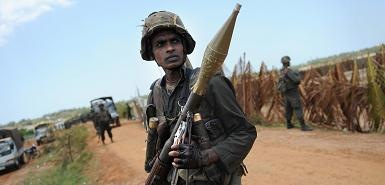 The European Commission is to recommend withdrawing trade benefits from Sri Lanka over alleged human rights abuses in the last stages of the civil war against the Tamil Tigers, The Times has learnt.
The European Commission is to recommend withdrawing trade benefits from Sri Lanka over alleged human rights abuses in the last stages of the civil war against the Tamil Tigers, The Times has learnt.
The decision could affect British shops including Marks & Spencer, Tesco and Next, which have imported hundreds of millions of poundsworth of Sri Lankan-made clothes since the benefits were granted after a tsunami in 2004. The scheme waives import taxes.
Withdrawing the benefits would add about 6 per cent to the cost of products, forcing many retailers to buy from cheaper producers such as China, India and Bangladesh.
It is the most drastic international response yet to the war — in which UN officials estimate that 20,000 civilians died — and to the subsequent detention of 300,000 Tamil civilians in internment camps.
The Sri Lankan garment industry accounts for 10 per cent of GDP, employs about 250,000 people and recorded exports of $1.4 billion (£856 million) to the EU last year.
EU officials said that they had no option because the scheme obliged Sri Lanka to abide by rights agreements and its Government had refused to co-operate.
The commission will make the recommendation on Monday when it formally approves and publishes the results of an investigation. A decision will not be taken until the end of the year.
The EU grants the Generalised System of Preferences Plus (GSP+), to help developing countries to boost their economies while improving human rights and labour standards. Sri Lanka is the only country in Asia to benefit from GSP+, which obliges beneficiaries to adhere to 27 international rights agreements.
The EU has investigated whether Sri Lanka violated the UN Convention against Torture, UN Convention on the Rights of the Child and UN Covenant on Civil and Political Rights. In August it completed a report, which described a culture of “complete or virtually complete impunity in Sri Lanka”, citing police torture, abductions of journalists and uninvestigated disappearances.
Sri Lankan officials accused the EU of seeking to punish workers. Its ministers met business leaders and politicians in London and Brussels.
They won support from Sir Stuart Rose, the chairman of Marks & Spencer, who met the Sri Lankan Trade Minister in London in June.
(For updates you can share with your friends, follow TNN on Facebook and Twitter )
